Importance of Tourism in London
VerifiedAdded on 2023/01/23
|14
|3697
|94
AI Summary
This article discusses the importance of tourism in London and its impact on the economy. It explores the challenges faced by the tourism sector, such as climate change, erosion, and economic hindrances. The article also suggests innovative solutions to overcome these challenges.
Contribute Materials
Your contribution can guide someone’s learning journey. Share your
documents today.
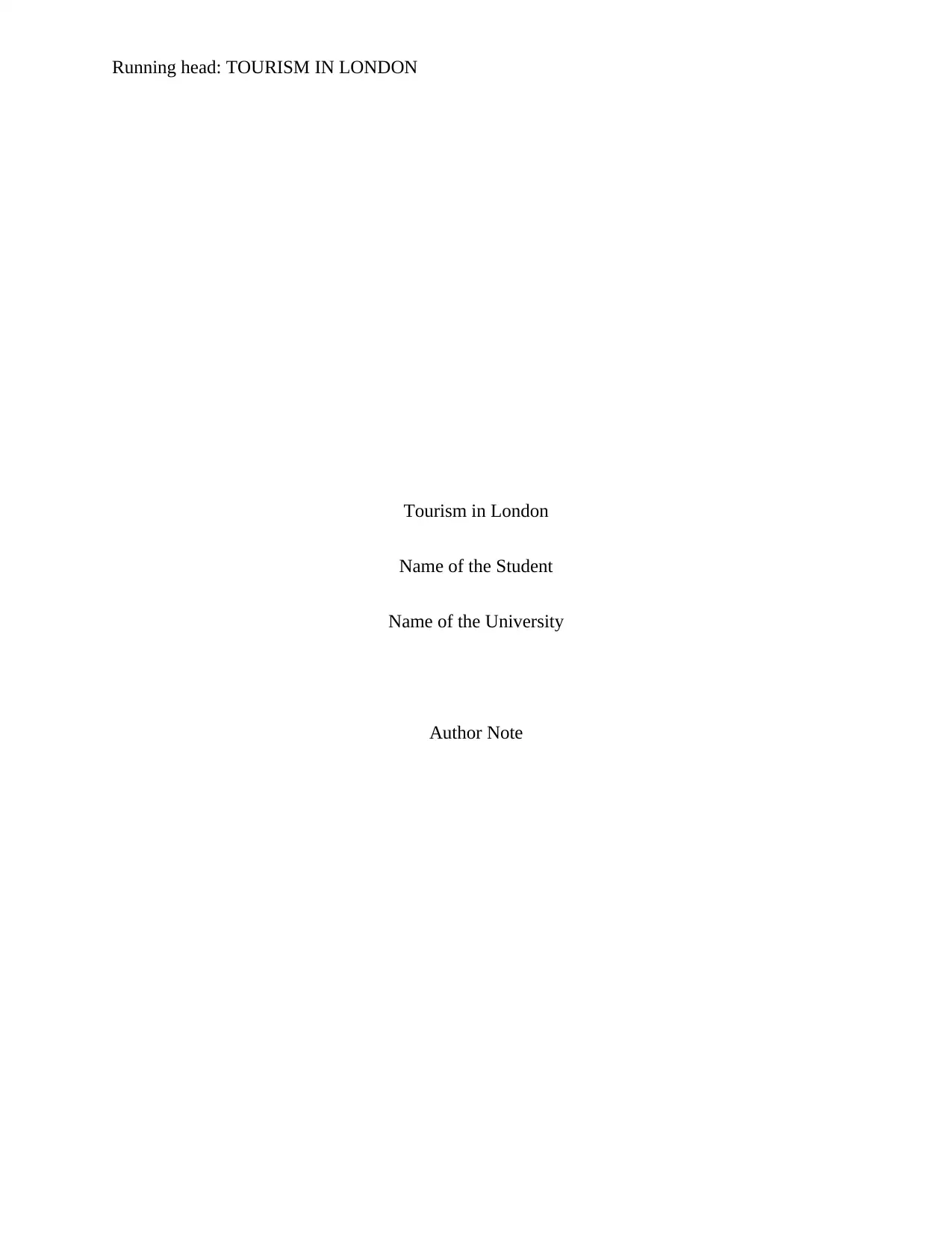
Running head: TOURISM IN LONDON
Tourism in London
Name of the Student
Name of the University
Author Note
Tourism in London
Name of the Student
Name of the University
Author Note
Secure Best Marks with AI Grader
Need help grading? Try our AI Grader for instant feedback on your assignments.
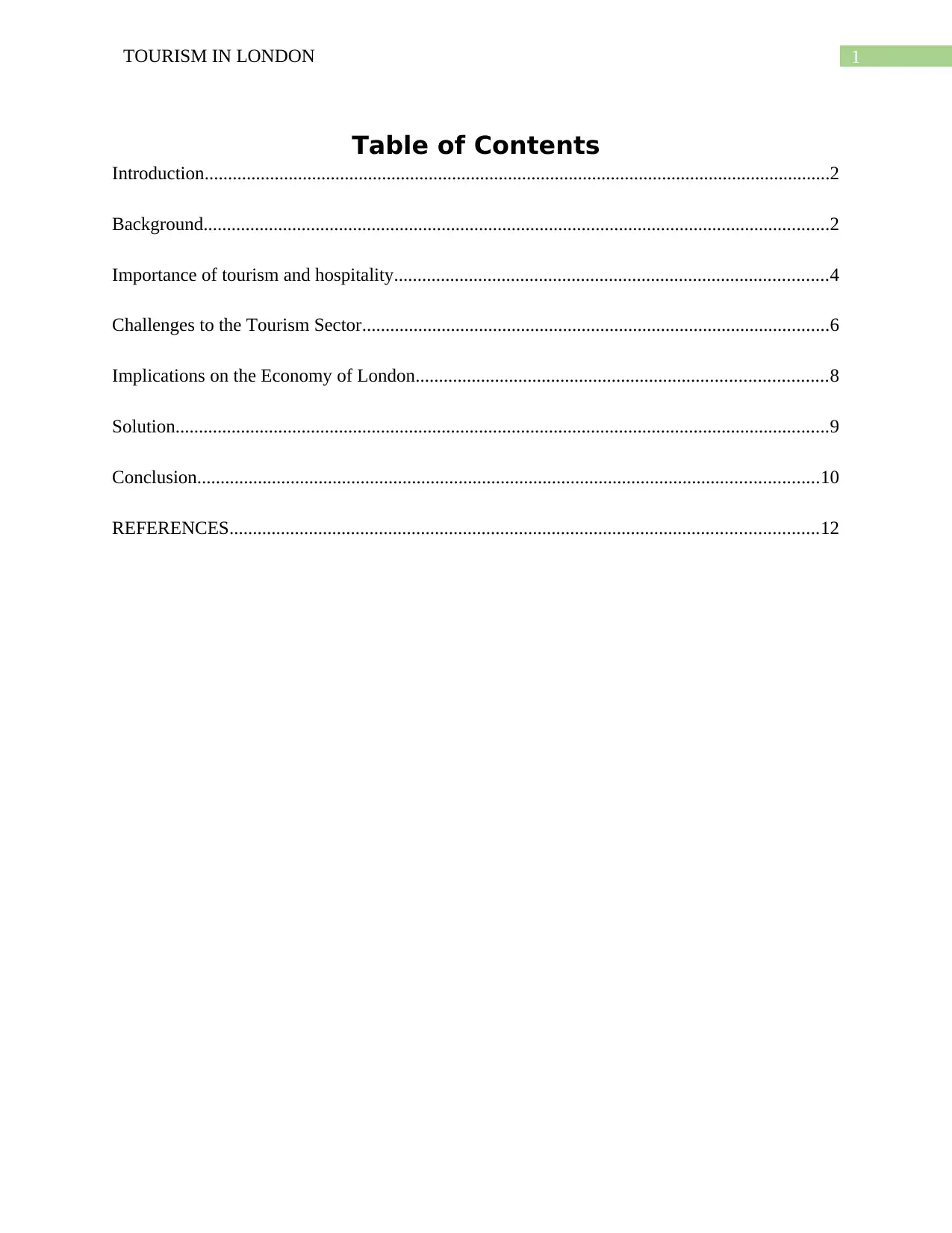
1TOURISM IN LONDON
Table of Contents
Introduction......................................................................................................................................2
Background......................................................................................................................................2
Importance of tourism and hospitality.............................................................................................4
Challenges to the Tourism Sector....................................................................................................6
Implications on the Economy of London........................................................................................8
Solution............................................................................................................................................9
Conclusion.....................................................................................................................................10
REFERENCES..............................................................................................................................12
Table of Contents
Introduction......................................................................................................................................2
Background......................................................................................................................................2
Importance of tourism and hospitality.............................................................................................4
Challenges to the Tourism Sector....................................................................................................6
Implications on the Economy of London........................................................................................8
Solution............................................................................................................................................9
Conclusion.....................................................................................................................................10
REFERENCES..............................................................................................................................12
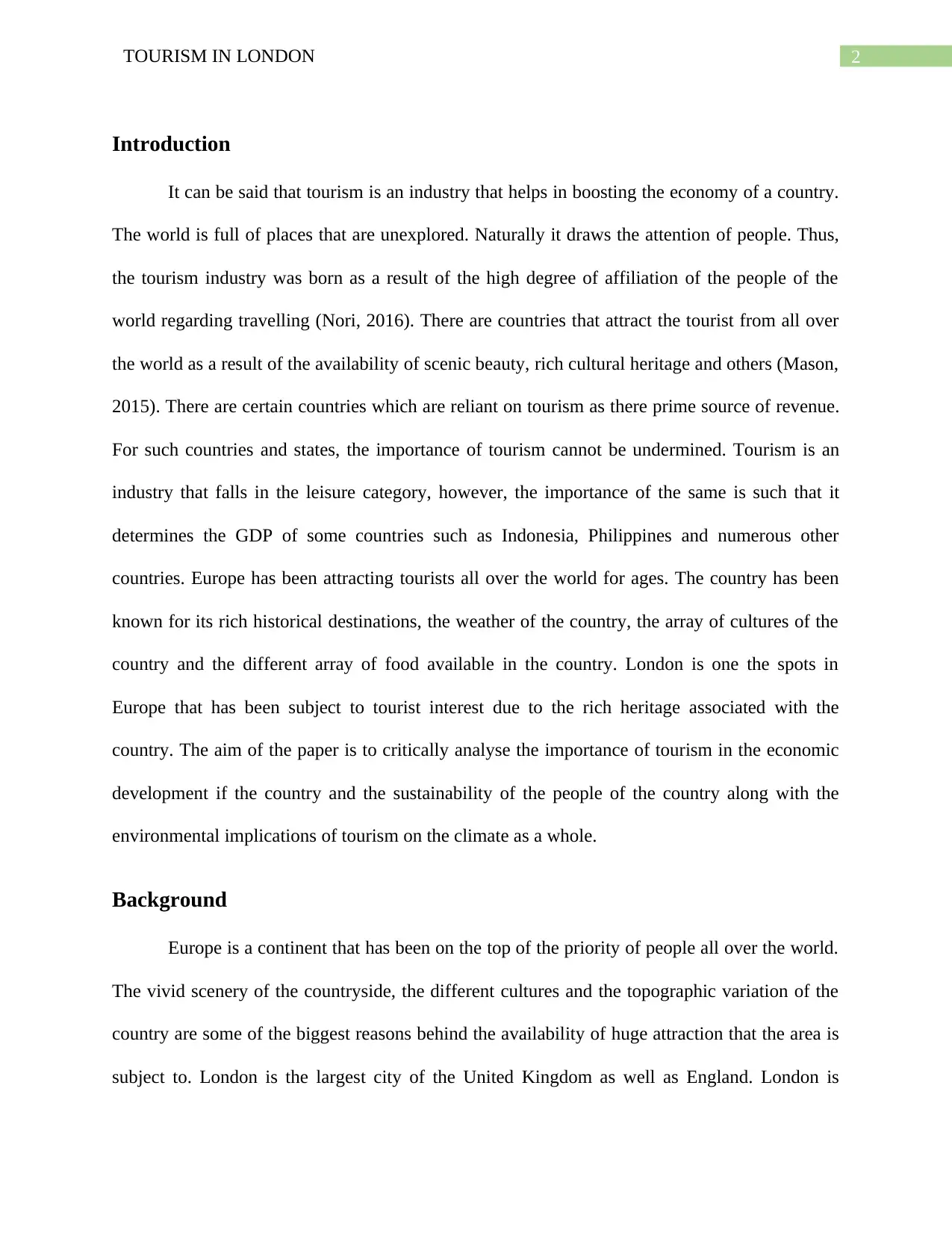
2TOURISM IN LONDON
Introduction
It can be said that tourism is an industry that helps in boosting the economy of a country.
The world is full of places that are unexplored. Naturally it draws the attention of people. Thus,
the tourism industry was born as a result of the high degree of affiliation of the people of the
world regarding travelling (Nori, 2016). There are countries that attract the tourist from all over
the world as a result of the availability of scenic beauty, rich cultural heritage and others (Mason,
2015). There are certain countries which are reliant on tourism as there prime source of revenue.
For such countries and states, the importance of tourism cannot be undermined. Tourism is an
industry that falls in the leisure category, however, the importance of the same is such that it
determines the GDP of some countries such as Indonesia, Philippines and numerous other
countries. Europe has been attracting tourists all over the world for ages. The country has been
known for its rich historical destinations, the weather of the country, the array of cultures of the
country and the different array of food available in the country. London is one the spots in
Europe that has been subject to tourist interest due to the rich heritage associated with the
country. The aim of the paper is to critically analyse the importance of tourism in the economic
development if the country and the sustainability of the people of the country along with the
environmental implications of tourism on the climate as a whole.
Background
Europe is a continent that has been on the top of the priority of people all over the world.
The vivid scenery of the countryside, the different cultures and the topographic variation of the
country are some of the biggest reasons behind the availability of huge attraction that the area is
subject to. London is the largest city of the United Kingdom as well as England. London is
Introduction
It can be said that tourism is an industry that helps in boosting the economy of a country.
The world is full of places that are unexplored. Naturally it draws the attention of people. Thus,
the tourism industry was born as a result of the high degree of affiliation of the people of the
world regarding travelling (Nori, 2016). There are countries that attract the tourist from all over
the world as a result of the availability of scenic beauty, rich cultural heritage and others (Mason,
2015). There are certain countries which are reliant on tourism as there prime source of revenue.
For such countries and states, the importance of tourism cannot be undermined. Tourism is an
industry that falls in the leisure category, however, the importance of the same is such that it
determines the GDP of some countries such as Indonesia, Philippines and numerous other
countries. Europe has been attracting tourists all over the world for ages. The country has been
known for its rich historical destinations, the weather of the country, the array of cultures of the
country and the different array of food available in the country. London is one the spots in
Europe that has been subject to tourist interest due to the rich heritage associated with the
country. The aim of the paper is to critically analyse the importance of tourism in the economic
development if the country and the sustainability of the people of the country along with the
environmental implications of tourism on the climate as a whole.
Background
Europe is a continent that has been on the top of the priority of people all over the world.
The vivid scenery of the countryside, the different cultures and the topographic variation of the
country are some of the biggest reasons behind the availability of huge attraction that the area is
subject to. London is the largest city of the United Kingdom as well as England. London is
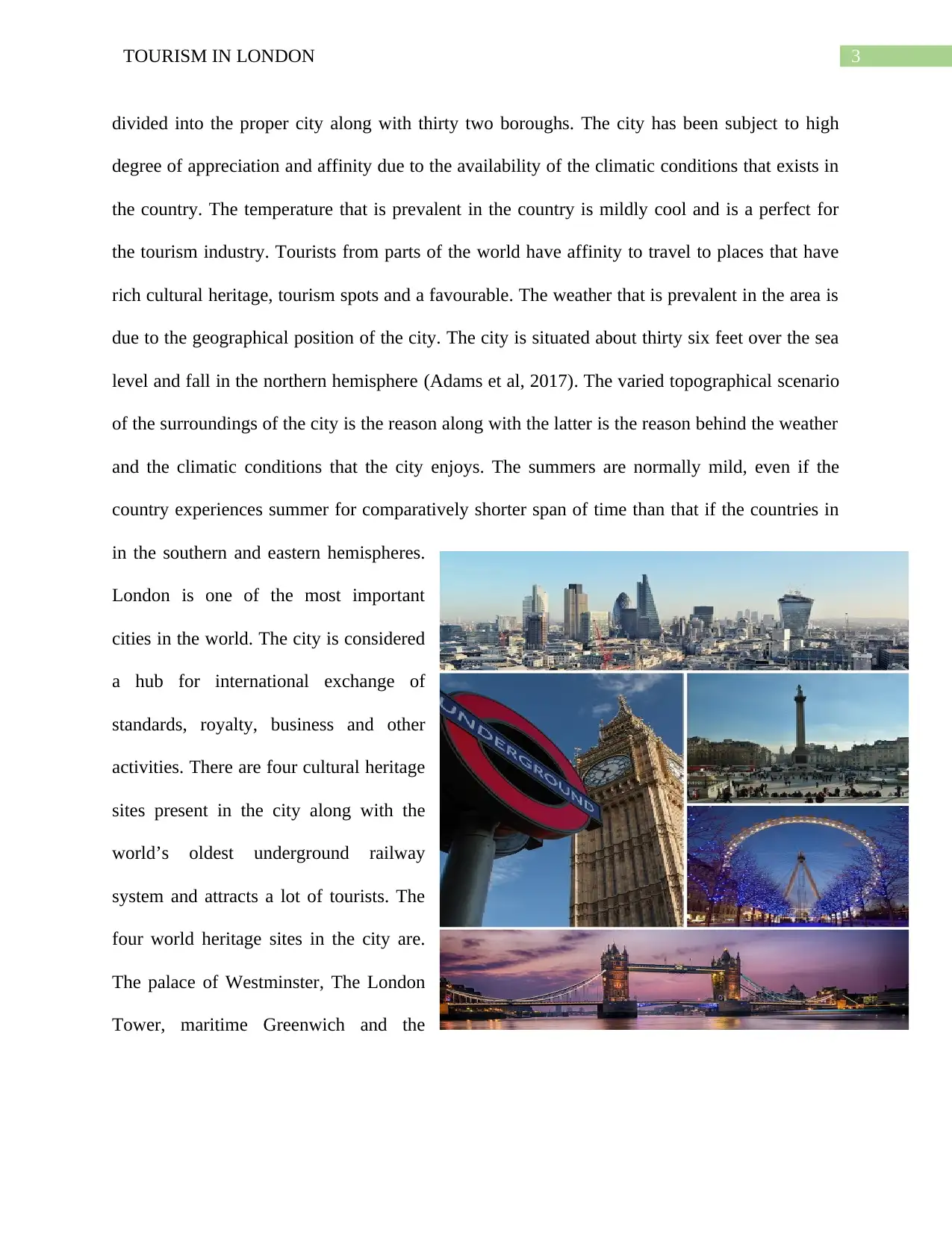
3TOURISM IN LONDON
divided into the proper city along with thirty two boroughs. The city has been subject to high
degree of appreciation and affinity due to the availability of the climatic conditions that exists in
the country. The temperature that is prevalent in the country is mildly cool and is a perfect for
the tourism industry. Tourists from parts of the world have affinity to travel to places that have
rich cultural heritage, tourism spots and a favourable. The weather that is prevalent in the area is
due to the geographical position of the city. The city is situated about thirty six feet over the sea
level and fall in the northern hemisphere (Adams et al, 2017). The varied topographical scenario
of the surroundings of the city is the reason along with the latter is the reason behind the weather
and the climatic conditions that the city enjoys. The summers are normally mild, even if the
country experiences summer for comparatively shorter span of time than that if the countries in
in the southern and eastern hemispheres.
London is one of the most important
cities in the world. The city is considered
a hub for international exchange of
standards, royalty, business and other
activities. There are four cultural heritage
sites present in the city along with the
world’s oldest underground railway
system and attracts a lot of tourists. The
four world heritage sites in the city are.
The palace of Westminster, The London
Tower, maritime Greenwich and the
divided into the proper city along with thirty two boroughs. The city has been subject to high
degree of appreciation and affinity due to the availability of the climatic conditions that exists in
the country. The temperature that is prevalent in the country is mildly cool and is a perfect for
the tourism industry. Tourists from parts of the world have affinity to travel to places that have
rich cultural heritage, tourism spots and a favourable. The weather that is prevalent in the area is
due to the geographical position of the city. The city is situated about thirty six feet over the sea
level and fall in the northern hemisphere (Adams et al, 2017). The varied topographical scenario
of the surroundings of the city is the reason along with the latter is the reason behind the weather
and the climatic conditions that the city enjoys. The summers are normally mild, even if the
country experiences summer for comparatively shorter span of time than that if the countries in
in the southern and eastern hemispheres.
London is one of the most important
cities in the world. The city is considered
a hub for international exchange of
standards, royalty, business and other
activities. There are four cultural heritage
sites present in the city along with the
world’s oldest underground railway
system and attracts a lot of tourists. The
four world heritage sites in the city are.
The palace of Westminster, The London
Tower, maritime Greenwich and the
Secure Best Marks with AI Grader
Need help grading? Try our AI Grader for instant feedback on your assignments.
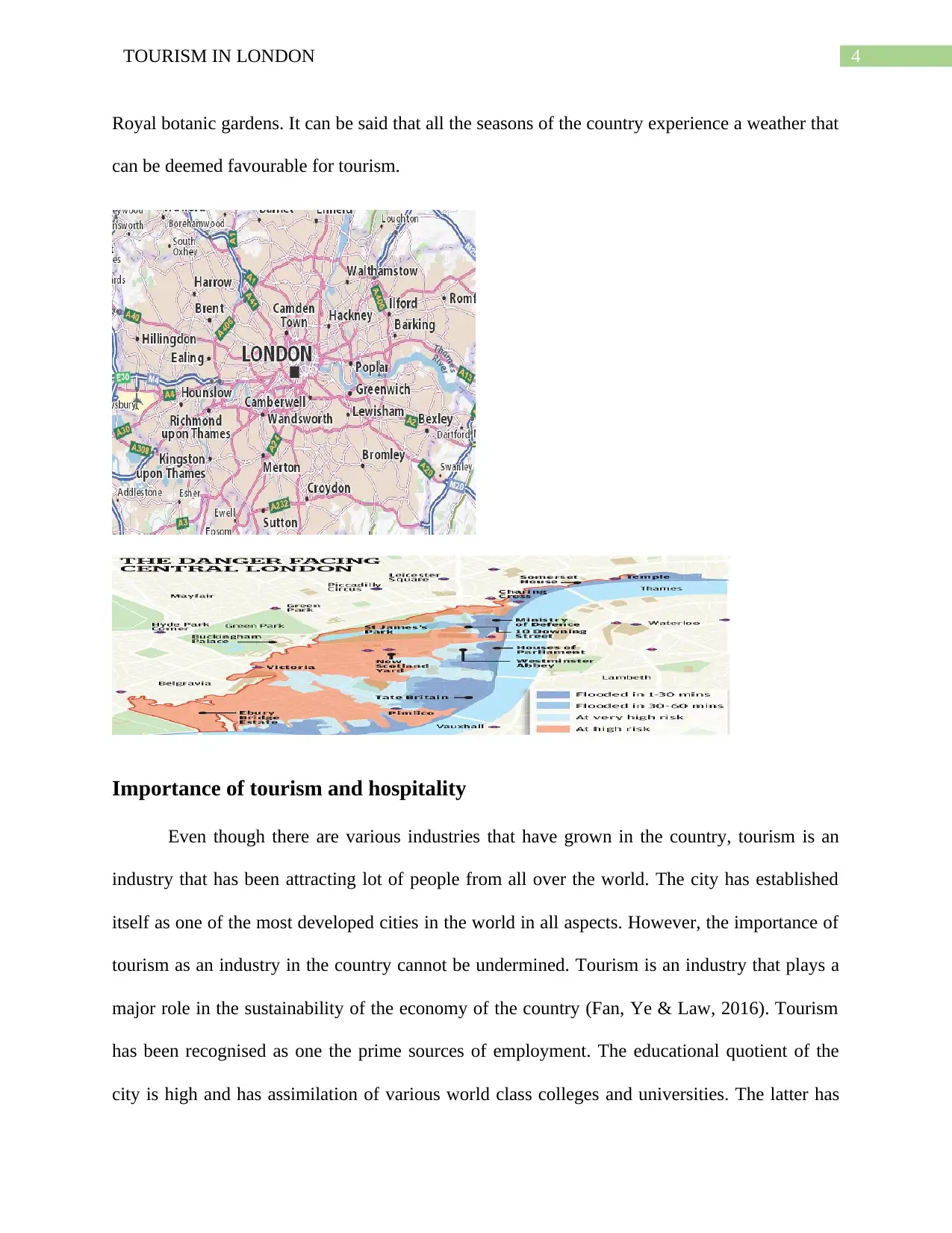
4TOURISM IN LONDON
Royal botanic gardens. It can be said that all the seasons of the country experience a weather that
can be deemed favourable for tourism.
Importance of tourism and hospitality
Even though there are various industries that have grown in the country, tourism is an
industry that has been attracting lot of people from all over the world. The city has established
itself as one of the most developed cities in the world in all aspects. However, the importance of
tourism as an industry in the country cannot be undermined. Tourism is an industry that plays a
major role in the sustainability of the economy of the country (Fan, Ye & Law, 2016). Tourism
has been recognised as one the prime sources of employment. The educational quotient of the
city is high and has assimilation of various world class colleges and universities. The latter has
Royal botanic gardens. It can be said that all the seasons of the country experience a weather that
can be deemed favourable for tourism.
Importance of tourism and hospitality
Even though there are various industries that have grown in the country, tourism is an
industry that has been attracting lot of people from all over the world. The city has established
itself as one of the most developed cities in the world in all aspects. However, the importance of
tourism as an industry in the country cannot be undermined. Tourism is an industry that plays a
major role in the sustainability of the economy of the country (Fan, Ye & Law, 2016). Tourism
has been recognised as one the prime sources of employment. The educational quotient of the
city is high and has assimilation of various world class colleges and universities. The latter has
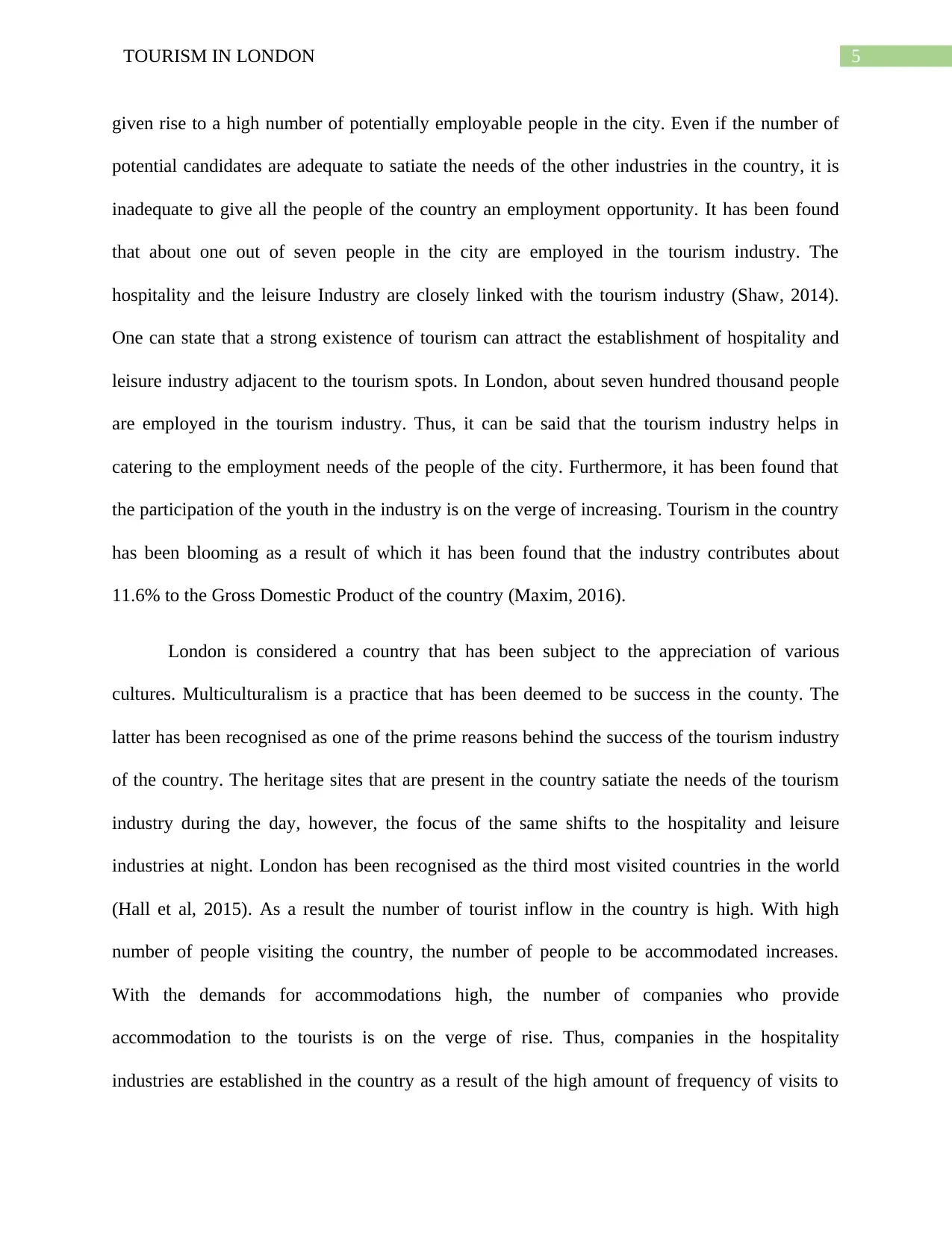
5TOURISM IN LONDON
given rise to a high number of potentially employable people in the city. Even if the number of
potential candidates are adequate to satiate the needs of the other industries in the country, it is
inadequate to give all the people of the country an employment opportunity. It has been found
that about one out of seven people in the city are employed in the tourism industry. The
hospitality and the leisure Industry are closely linked with the tourism industry (Shaw, 2014).
One can state that a strong existence of tourism can attract the establishment of hospitality and
leisure industry adjacent to the tourism spots. In London, about seven hundred thousand people
are employed in the tourism industry. Thus, it can be said that the tourism industry helps in
catering to the employment needs of the people of the city. Furthermore, it has been found that
the participation of the youth in the industry is on the verge of increasing. Tourism in the country
has been blooming as a result of which it has been found that the industry contributes about
11.6% to the Gross Domestic Product of the country (Maxim, 2016).
London is considered a country that has been subject to the appreciation of various
cultures. Multiculturalism is a practice that has been deemed to be success in the county. The
latter has been recognised as one of the prime reasons behind the success of the tourism industry
of the country. The heritage sites that are present in the country satiate the needs of the tourism
industry during the day, however, the focus of the same shifts to the hospitality and leisure
industries at night. London has been recognised as the third most visited countries in the world
(Hall et al, 2015). As a result the number of tourist inflow in the country is high. With high
number of people visiting the country, the number of people to be accommodated increases.
With the demands for accommodations high, the number of companies who provide
accommodation to the tourists is on the verge of rise. Thus, companies in the hospitality
industries are established in the country as a result of the high amount of frequency of visits to
given rise to a high number of potentially employable people in the city. Even if the number of
potential candidates are adequate to satiate the needs of the other industries in the country, it is
inadequate to give all the people of the country an employment opportunity. It has been found
that about one out of seven people in the city are employed in the tourism industry. The
hospitality and the leisure Industry are closely linked with the tourism industry (Shaw, 2014).
One can state that a strong existence of tourism can attract the establishment of hospitality and
leisure industry adjacent to the tourism spots. In London, about seven hundred thousand people
are employed in the tourism industry. Thus, it can be said that the tourism industry helps in
catering to the employment needs of the people of the city. Furthermore, it has been found that
the participation of the youth in the industry is on the verge of increasing. Tourism in the country
has been blooming as a result of which it has been found that the industry contributes about
11.6% to the Gross Domestic Product of the country (Maxim, 2016).
London is considered a country that has been subject to the appreciation of various
cultures. Multiculturalism is a practice that has been deemed to be success in the county. The
latter has been recognised as one of the prime reasons behind the success of the tourism industry
of the country. The heritage sites that are present in the country satiate the needs of the tourism
industry during the day, however, the focus of the same shifts to the hospitality and leisure
industries at night. London has been recognised as the third most visited countries in the world
(Hall et al, 2015). As a result the number of tourist inflow in the country is high. With high
number of people visiting the country, the number of people to be accommodated increases.
With the demands for accommodations high, the number of companies who provide
accommodation to the tourists is on the verge of rise. Thus, companies in the hospitality
industries are established in the country as a result of the high amount of frequency of visits to
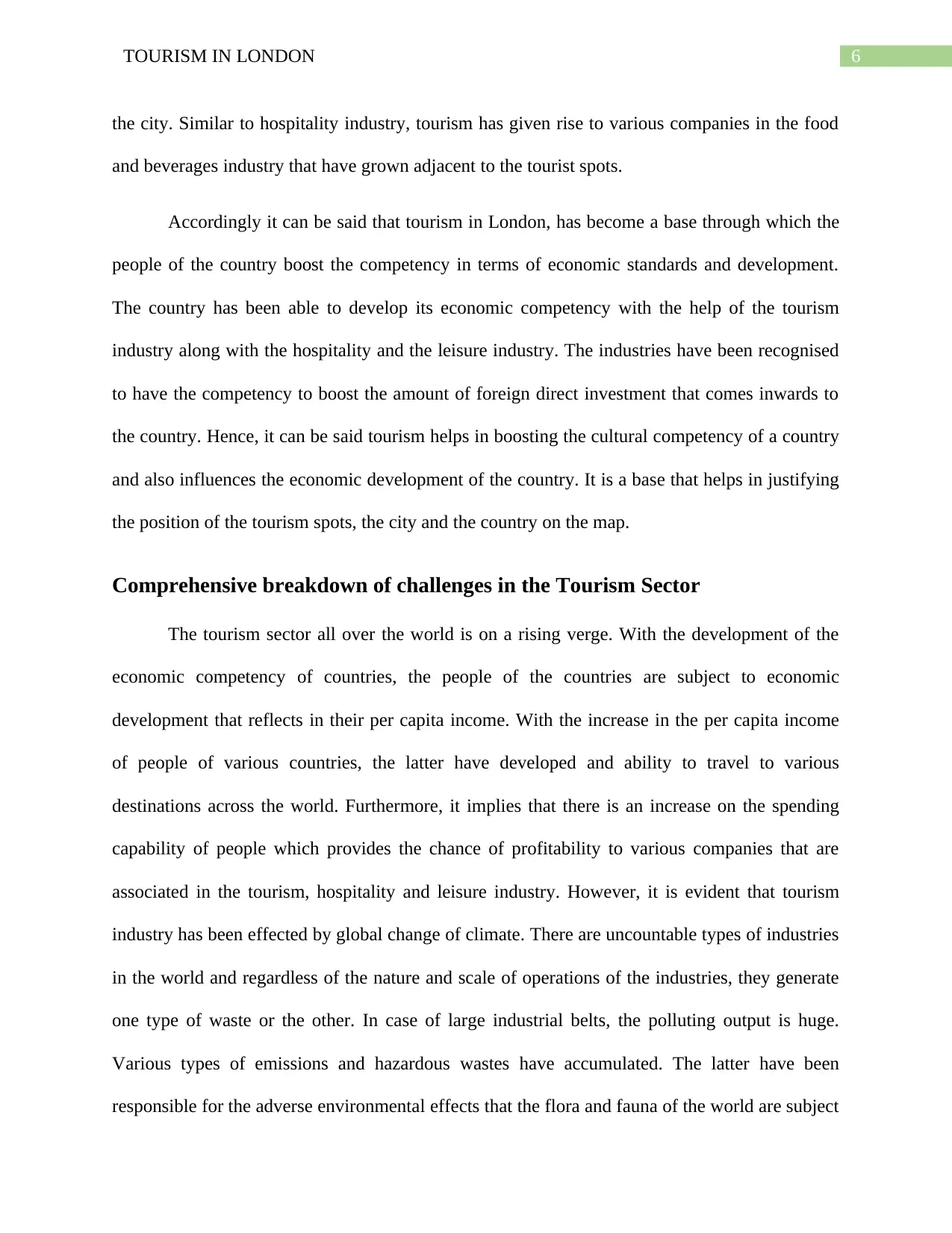
6TOURISM IN LONDON
the city. Similar to hospitality industry, tourism has given rise to various companies in the food
and beverages industry that have grown adjacent to the tourist spots.
Accordingly it can be said that tourism in London, has become a base through which the
people of the country boost the competency in terms of economic standards and development.
The country has been able to develop its economic competency with the help of the tourism
industry along with the hospitality and the leisure industry. The industries have been recognised
to have the competency to boost the amount of foreign direct investment that comes inwards to
the country. Hence, it can be said tourism helps in boosting the cultural competency of a country
and also influences the economic development of the country. It is a base that helps in justifying
the position of the tourism spots, the city and the country on the map.
Comprehensive breakdown of challenges in the Tourism Sector
The tourism sector all over the world is on a rising verge. With the development of the
economic competency of countries, the people of the countries are subject to economic
development that reflects in their per capita income. With the increase in the per capita income
of people of various countries, the latter have developed and ability to travel to various
destinations across the world. Furthermore, it implies that there is an increase on the spending
capability of people which provides the chance of profitability to various companies that are
associated in the tourism, hospitality and leisure industry. However, it is evident that tourism
industry has been effected by global change of climate. There are uncountable types of industries
in the world and regardless of the nature and scale of operations of the industries, they generate
one type of waste or the other. In case of large industrial belts, the polluting output is huge.
Various types of emissions and hazardous wastes have accumulated. The latter have been
responsible for the adverse environmental effects that the flora and fauna of the world are subject
the city. Similar to hospitality industry, tourism has given rise to various companies in the food
and beverages industry that have grown adjacent to the tourist spots.
Accordingly it can be said that tourism in London, has become a base through which the
people of the country boost the competency in terms of economic standards and development.
The country has been able to develop its economic competency with the help of the tourism
industry along with the hospitality and the leisure industry. The industries have been recognised
to have the competency to boost the amount of foreign direct investment that comes inwards to
the country. Hence, it can be said tourism helps in boosting the cultural competency of a country
and also influences the economic development of the country. It is a base that helps in justifying
the position of the tourism spots, the city and the country on the map.
Comprehensive breakdown of challenges in the Tourism Sector
The tourism sector all over the world is on a rising verge. With the development of the
economic competency of countries, the people of the countries are subject to economic
development that reflects in their per capita income. With the increase in the per capita income
of people of various countries, the latter have developed and ability to travel to various
destinations across the world. Furthermore, it implies that there is an increase on the spending
capability of people which provides the chance of profitability to various companies that are
associated in the tourism, hospitality and leisure industry. However, it is evident that tourism
industry has been effected by global change of climate. There are uncountable types of industries
in the world and regardless of the nature and scale of operations of the industries, they generate
one type of waste or the other. In case of large industrial belts, the polluting output is huge.
Various types of emissions and hazardous wastes have accumulated. The latter have been
responsible for the adverse environmental effects that the flora and fauna of the world are subject
Paraphrase This Document
Need a fresh take? Get an instant paraphrase of this document with our AI Paraphraser
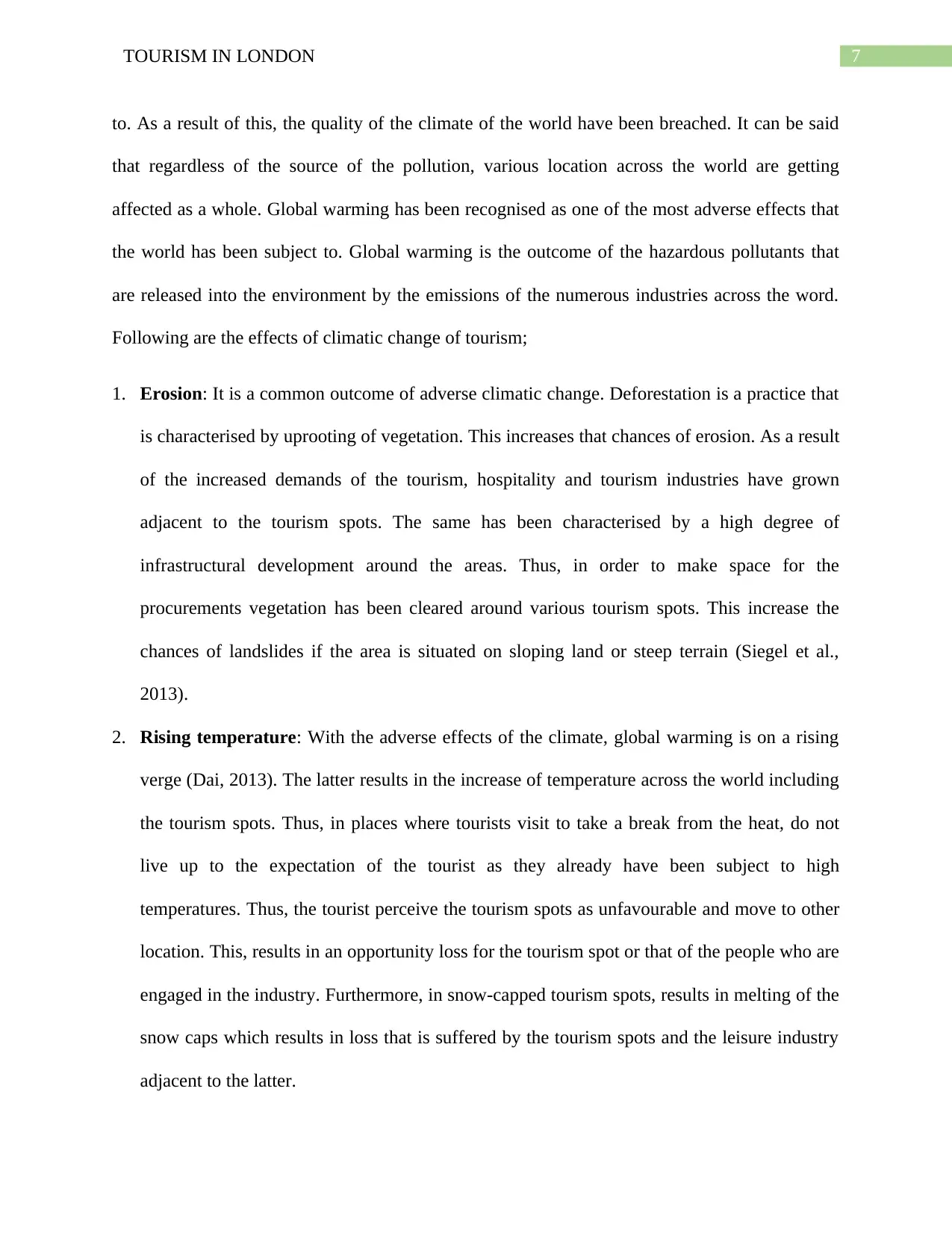
7TOURISM IN LONDON
to. As a result of this, the quality of the climate of the world have been breached. It can be said
that regardless of the source of the pollution, various location across the world are getting
affected as a whole. Global warming has been recognised as one of the most adverse effects that
the world has been subject to. Global warming is the outcome of the hazardous pollutants that
are released into the environment by the emissions of the numerous industries across the word.
Following are the effects of climatic change of tourism;
1. Erosion: It is a common outcome of adverse climatic change. Deforestation is a practice that
is characterised by uprooting of vegetation. This increases that chances of erosion. As a result
of the increased demands of the tourism, hospitality and tourism industries have grown
adjacent to the tourism spots. The same has been characterised by a high degree of
infrastructural development around the areas. Thus, in order to make space for the
procurements vegetation has been cleared around various tourism spots. This increase the
chances of landslides if the area is situated on sloping land or steep terrain (Siegel et al.,
2013).
2. Rising temperature: With the adverse effects of the climate, global warming is on a rising
verge (Dai, 2013). The latter results in the increase of temperature across the world including
the tourism spots. Thus, in places where tourists visit to take a break from the heat, do not
live up to the expectation of the tourist as they already have been subject to high
temperatures. Thus, the tourist perceive the tourism spots as unfavourable and move to other
location. This, results in an opportunity loss for the tourism spot or that of the people who are
engaged in the industry. Furthermore, in snow-capped tourism spots, results in melting of the
snow caps which results in loss that is suffered by the tourism spots and the leisure industry
adjacent to the latter.
to. As a result of this, the quality of the climate of the world have been breached. It can be said
that regardless of the source of the pollution, various location across the world are getting
affected as a whole. Global warming has been recognised as one of the most adverse effects that
the world has been subject to. Global warming is the outcome of the hazardous pollutants that
are released into the environment by the emissions of the numerous industries across the word.
Following are the effects of climatic change of tourism;
1. Erosion: It is a common outcome of adverse climatic change. Deforestation is a practice that
is characterised by uprooting of vegetation. This increases that chances of erosion. As a result
of the increased demands of the tourism, hospitality and tourism industries have grown
adjacent to the tourism spots. The same has been characterised by a high degree of
infrastructural development around the areas. Thus, in order to make space for the
procurements vegetation has been cleared around various tourism spots. This increase the
chances of landslides if the area is situated on sloping land or steep terrain (Siegel et al.,
2013).
2. Rising temperature: With the adverse effects of the climate, global warming is on a rising
verge (Dai, 2013). The latter results in the increase of temperature across the world including
the tourism spots. Thus, in places where tourists visit to take a break from the heat, do not
live up to the expectation of the tourist as they already have been subject to high
temperatures. Thus, the tourist perceive the tourism spots as unfavourable and move to other
location. This, results in an opportunity loss for the tourism spot or that of the people who are
engaged in the industry. Furthermore, in snow-capped tourism spots, results in melting of the
snow caps which results in loss that is suffered by the tourism spots and the leisure industry
adjacent to the latter.
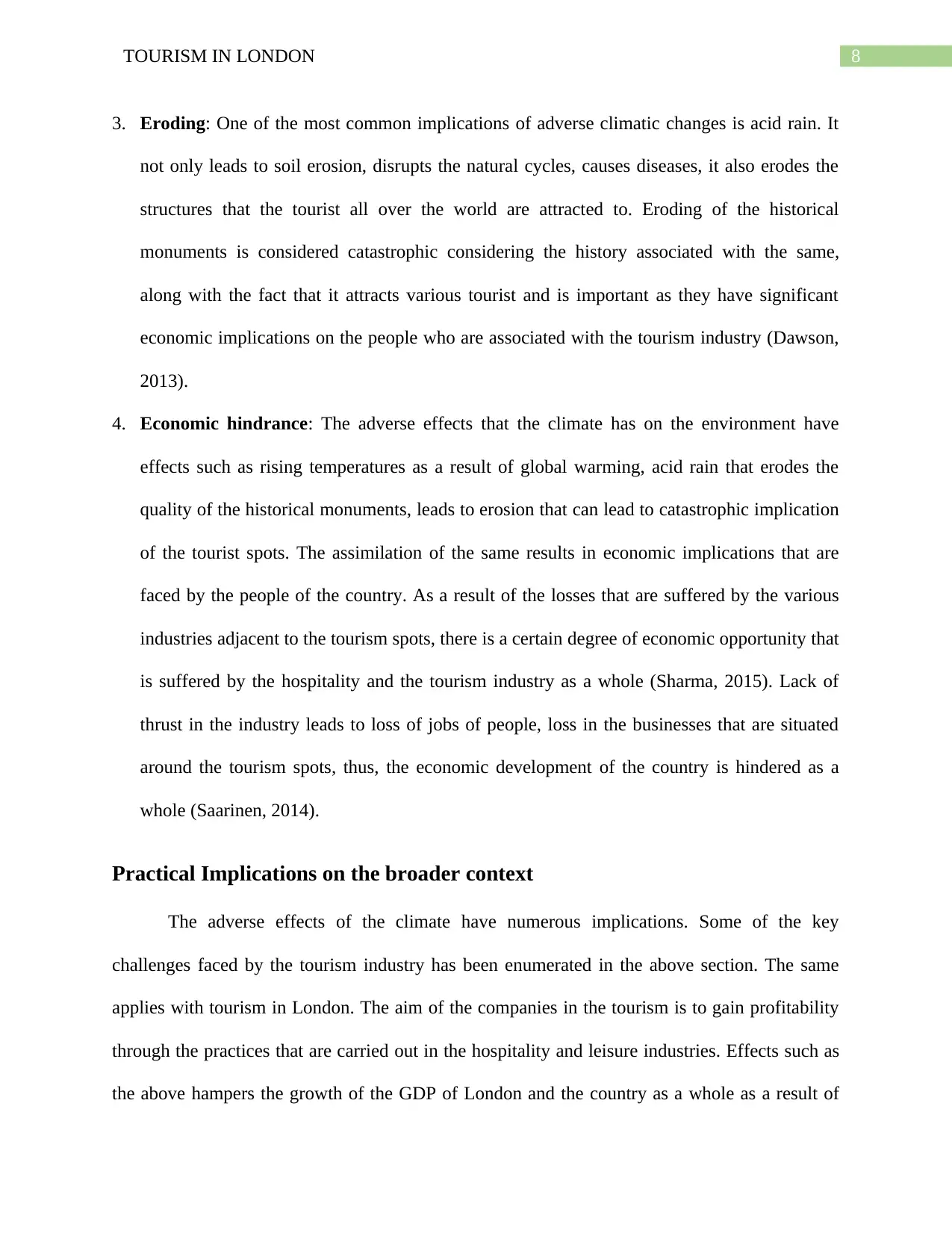
8TOURISM IN LONDON
3. Eroding: One of the most common implications of adverse climatic changes is acid rain. It
not only leads to soil erosion, disrupts the natural cycles, causes diseases, it also erodes the
structures that the tourist all over the world are attracted to. Eroding of the historical
monuments is considered catastrophic considering the history associated with the same,
along with the fact that it attracts various tourist and is important as they have significant
economic implications on the people who are associated with the tourism industry (Dawson,
2013).
4. Economic hindrance: The adverse effects that the climate has on the environment have
effects such as rising temperatures as a result of global warming, acid rain that erodes the
quality of the historical monuments, leads to erosion that can lead to catastrophic implication
of the tourist spots. The assimilation of the same results in economic implications that are
faced by the people of the country. As a result of the losses that are suffered by the various
industries adjacent to the tourism spots, there is a certain degree of economic opportunity that
is suffered by the hospitality and the tourism industry as a whole (Sharma, 2015). Lack of
thrust in the industry leads to loss of jobs of people, loss in the businesses that are situated
around the tourism spots, thus, the economic development of the country is hindered as a
whole (Saarinen, 2014).
Practical Implications on the broader context
The adverse effects of the climate have numerous implications. Some of the key
challenges faced by the tourism industry has been enumerated in the above section. The same
applies with tourism in London. The aim of the companies in the tourism is to gain profitability
through the practices that are carried out in the hospitality and leisure industries. Effects such as
the above hampers the growth of the GDP of London and the country as a whole as a result of
3. Eroding: One of the most common implications of adverse climatic changes is acid rain. It
not only leads to soil erosion, disrupts the natural cycles, causes diseases, it also erodes the
structures that the tourist all over the world are attracted to. Eroding of the historical
monuments is considered catastrophic considering the history associated with the same,
along with the fact that it attracts various tourist and is important as they have significant
economic implications on the people who are associated with the tourism industry (Dawson,
2013).
4. Economic hindrance: The adverse effects that the climate has on the environment have
effects such as rising temperatures as a result of global warming, acid rain that erodes the
quality of the historical monuments, leads to erosion that can lead to catastrophic implication
of the tourist spots. The assimilation of the same results in economic implications that are
faced by the people of the country. As a result of the losses that are suffered by the various
industries adjacent to the tourism spots, there is a certain degree of economic opportunity that
is suffered by the hospitality and the tourism industry as a whole (Sharma, 2015). Lack of
thrust in the industry leads to loss of jobs of people, loss in the businesses that are situated
around the tourism spots, thus, the economic development of the country is hindered as a
whole (Saarinen, 2014).
Practical Implications on the broader context
The adverse effects of the climate have numerous implications. Some of the key
challenges faced by the tourism industry has been enumerated in the above section. The same
applies with tourism in London. The aim of the companies in the tourism is to gain profitability
through the practices that are carried out in the hospitality and leisure industries. Effects such as
the above hampers the growth of the GDP of London and the country as a whole as a result of
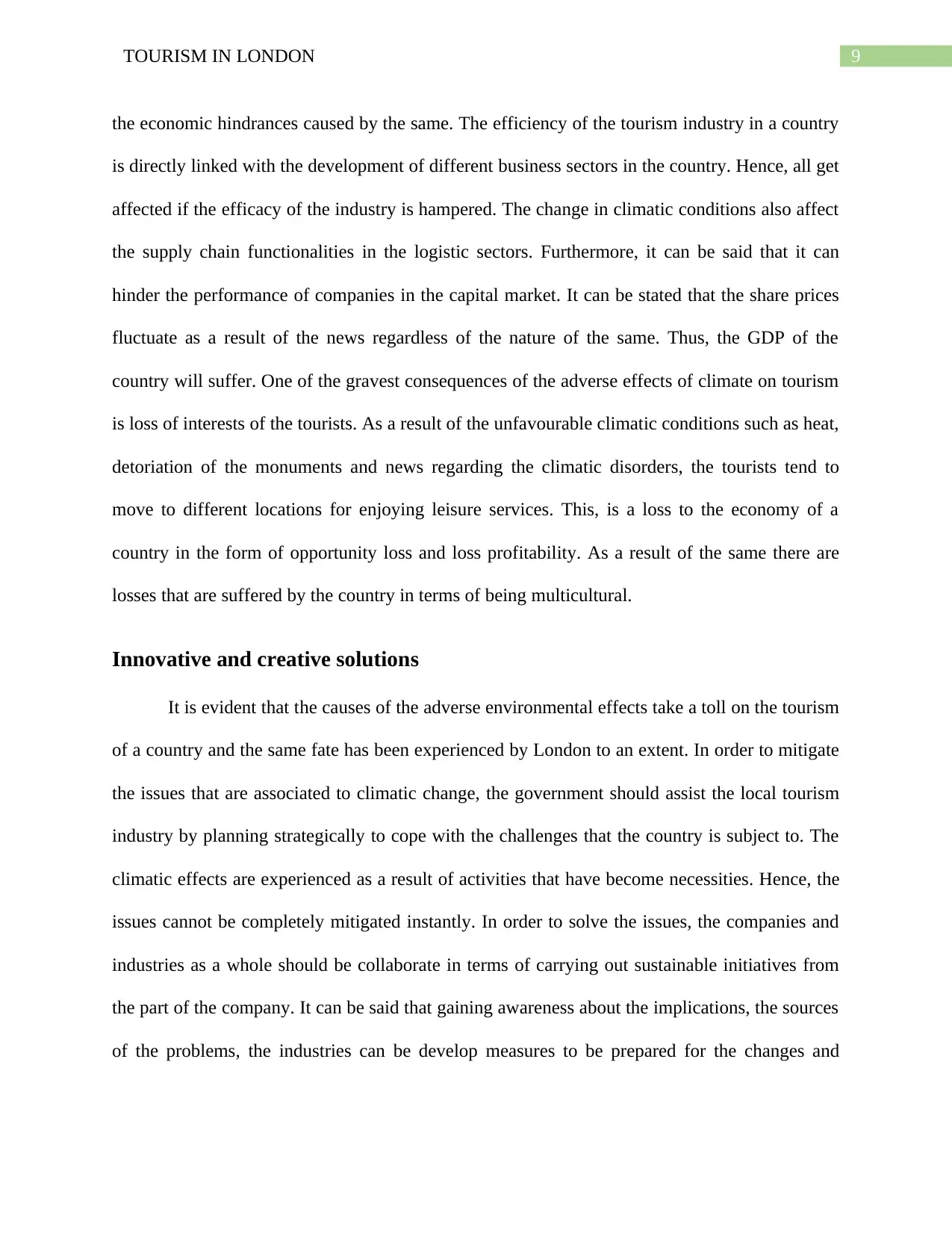
9TOURISM IN LONDON
the economic hindrances caused by the same. The efficiency of the tourism industry in a country
is directly linked with the development of different business sectors in the country. Hence, all get
affected if the efficacy of the industry is hampered. The change in climatic conditions also affect
the supply chain functionalities in the logistic sectors. Furthermore, it can be said that it can
hinder the performance of companies in the capital market. It can be stated that the share prices
fluctuate as a result of the news regardless of the nature of the same. Thus, the GDP of the
country will suffer. One of the gravest consequences of the adverse effects of climate on tourism
is loss of interests of the tourists. As a result of the unfavourable climatic conditions such as heat,
detoriation of the monuments and news regarding the climatic disorders, the tourists tend to
move to different locations for enjoying leisure services. This, is a loss to the economy of a
country in the form of opportunity loss and loss profitability. As a result of the same there are
losses that are suffered by the country in terms of being multicultural.
Innovative and creative solutions
It is evident that the causes of the adverse environmental effects take a toll on the tourism
of a country and the same fate has been experienced by London to an extent. In order to mitigate
the issues that are associated to climatic change, the government should assist the local tourism
industry by planning strategically to cope with the challenges that the country is subject to. The
climatic effects are experienced as a result of activities that have become necessities. Hence, the
issues cannot be completely mitigated instantly. In order to solve the issues, the companies and
industries as a whole should be collaborate in terms of carrying out sustainable initiatives from
the part of the company. It can be said that gaining awareness about the implications, the sources
of the problems, the industries can be develop measures to be prepared for the changes and
the economic hindrances caused by the same. The efficiency of the tourism industry in a country
is directly linked with the development of different business sectors in the country. Hence, all get
affected if the efficacy of the industry is hampered. The change in climatic conditions also affect
the supply chain functionalities in the logistic sectors. Furthermore, it can be said that it can
hinder the performance of companies in the capital market. It can be stated that the share prices
fluctuate as a result of the news regardless of the nature of the same. Thus, the GDP of the
country will suffer. One of the gravest consequences of the adverse effects of climate on tourism
is loss of interests of the tourists. As a result of the unfavourable climatic conditions such as heat,
detoriation of the monuments and news regarding the climatic disorders, the tourists tend to
move to different locations for enjoying leisure services. This, is a loss to the economy of a
country in the form of opportunity loss and loss profitability. As a result of the same there are
losses that are suffered by the country in terms of being multicultural.
Innovative and creative solutions
It is evident that the causes of the adverse environmental effects take a toll on the tourism
of a country and the same fate has been experienced by London to an extent. In order to mitigate
the issues that are associated to climatic change, the government should assist the local tourism
industry by planning strategically to cope with the challenges that the country is subject to. The
climatic effects are experienced as a result of activities that have become necessities. Hence, the
issues cannot be completely mitigated instantly. In order to solve the issues, the companies and
industries as a whole should be collaborate in terms of carrying out sustainable initiatives from
the part of the company. It can be said that gaining awareness about the implications, the sources
of the problems, the industries can be develop measures to be prepared for the changes and
Secure Best Marks with AI Grader
Need help grading? Try our AI Grader for instant feedback on your assignments.
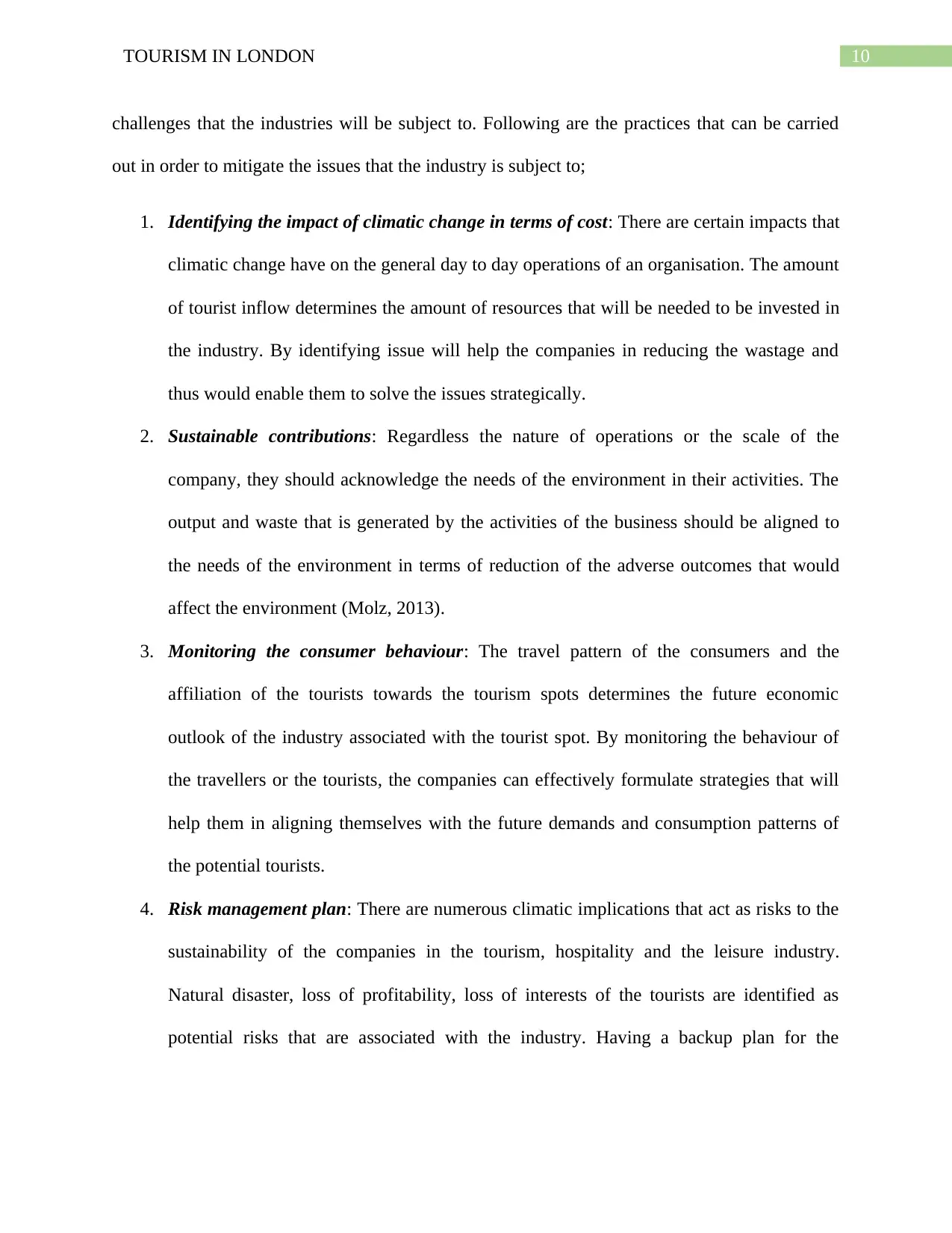
10TOURISM IN LONDON
challenges that the industries will be subject to. Following are the practices that can be carried
out in order to mitigate the issues that the industry is subject to;
1. Identifying the impact of climatic change in terms of cost: There are certain impacts that
climatic change have on the general day to day operations of an organisation. The amount
of tourist inflow determines the amount of resources that will be needed to be invested in
the industry. By identifying issue will help the companies in reducing the wastage and
thus would enable them to solve the issues strategically.
2. Sustainable contributions: Regardless the nature of operations or the scale of the
company, they should acknowledge the needs of the environment in their activities. The
output and waste that is generated by the activities of the business should be aligned to
the needs of the environment in terms of reduction of the adverse outcomes that would
affect the environment (Molz, 2013).
3. Monitoring the consumer behaviour: The travel pattern of the consumers and the
affiliation of the tourists towards the tourism spots determines the future economic
outlook of the industry associated with the tourist spot. By monitoring the behaviour of
the travellers or the tourists, the companies can effectively formulate strategies that will
help them in aligning themselves with the future demands and consumption patterns of
the potential tourists.
4. Risk management plan: There are numerous climatic implications that act as risks to the
sustainability of the companies in the tourism, hospitality and the leisure industry.
Natural disaster, loss of profitability, loss of interests of the tourists are identified as
potential risks that are associated with the industry. Having a backup plan for the
challenges that the industries will be subject to. Following are the practices that can be carried
out in order to mitigate the issues that the industry is subject to;
1. Identifying the impact of climatic change in terms of cost: There are certain impacts that
climatic change have on the general day to day operations of an organisation. The amount
of tourist inflow determines the amount of resources that will be needed to be invested in
the industry. By identifying issue will help the companies in reducing the wastage and
thus would enable them to solve the issues strategically.
2. Sustainable contributions: Regardless the nature of operations or the scale of the
company, they should acknowledge the needs of the environment in their activities. The
output and waste that is generated by the activities of the business should be aligned to
the needs of the environment in terms of reduction of the adverse outcomes that would
affect the environment (Molz, 2013).
3. Monitoring the consumer behaviour: The travel pattern of the consumers and the
affiliation of the tourists towards the tourism spots determines the future economic
outlook of the industry associated with the tourist spot. By monitoring the behaviour of
the travellers or the tourists, the companies can effectively formulate strategies that will
help them in aligning themselves with the future demands and consumption patterns of
the potential tourists.
4. Risk management plan: There are numerous climatic implications that act as risks to the
sustainability of the companies in the tourism, hospitality and the leisure industry.
Natural disaster, loss of profitability, loss of interests of the tourists are identified as
potential risks that are associated with the industry. Having a backup plan for the
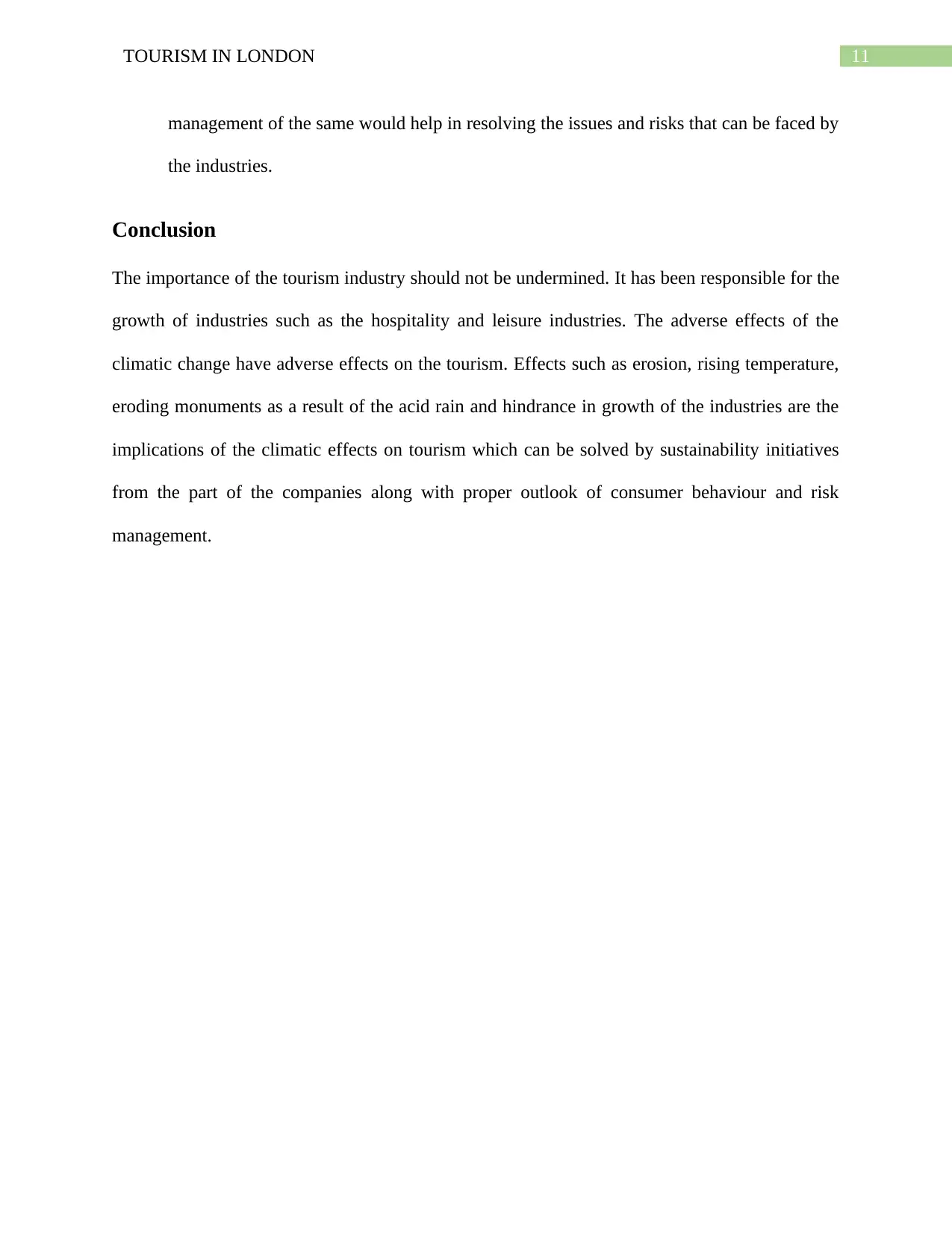
11TOURISM IN LONDON
management of the same would help in resolving the issues and risks that can be faced by
the industries.
Conclusion
The importance of the tourism industry should not be undermined. It has been responsible for the
growth of industries such as the hospitality and leisure industries. The adverse effects of the
climatic change have adverse effects on the tourism. Effects such as erosion, rising temperature,
eroding monuments as a result of the acid rain and hindrance in growth of the industries are the
implications of the climatic effects on tourism which can be solved by sustainability initiatives
from the part of the companies along with proper outlook of consumer behaviour and risk
management.
management of the same would help in resolving the issues and risks that can be faced by
the industries.
Conclusion
The importance of the tourism industry should not be undermined. It has been responsible for the
growth of industries such as the hospitality and leisure industries. The adverse effects of the
climatic change have adverse effects on the tourism. Effects such as erosion, rising temperature,
eroding monuments as a result of the acid rain and hindrance in growth of the industries are the
implications of the climatic effects on tourism which can be solved by sustainability initiatives
from the part of the companies along with proper outlook of consumer behaviour and risk
management.
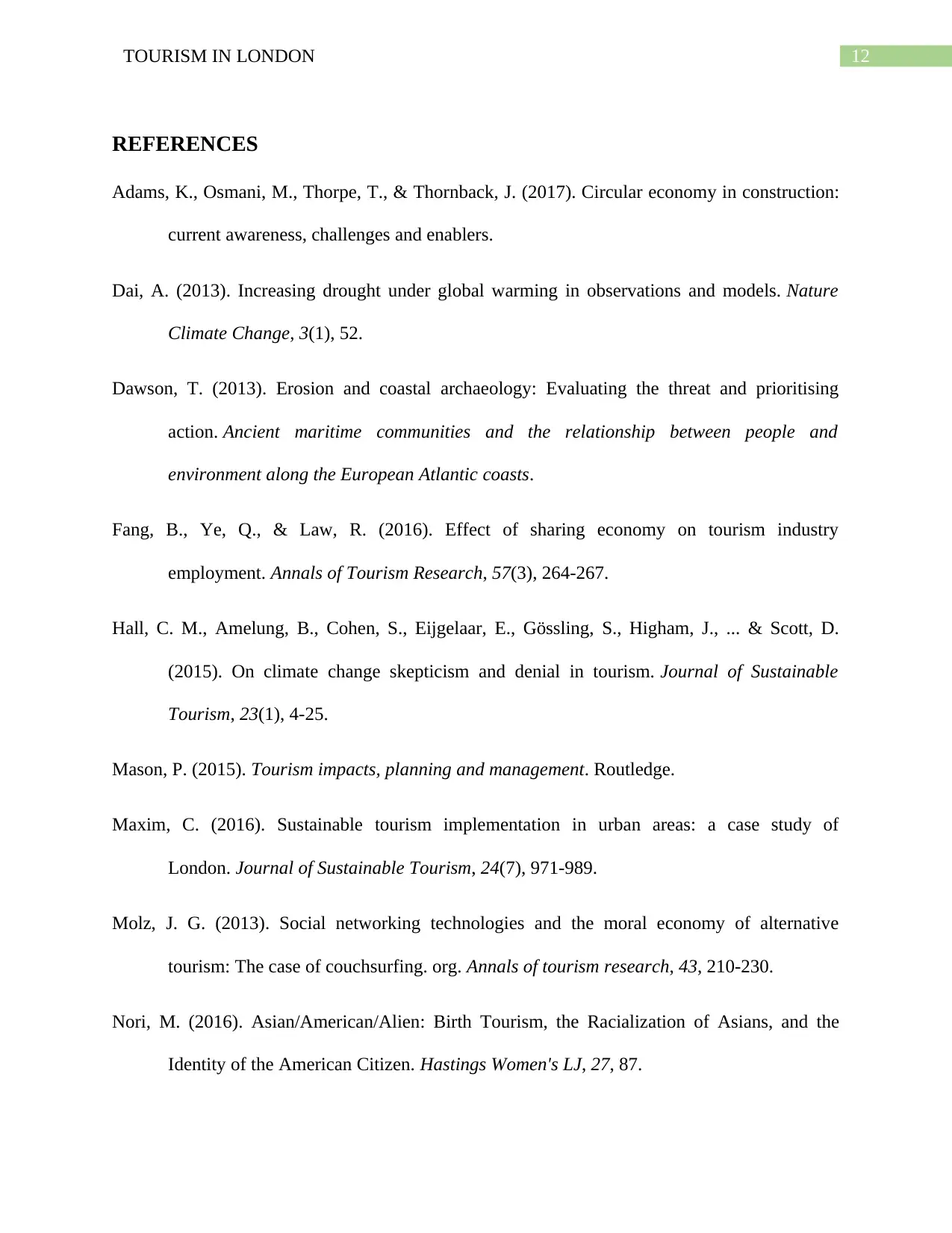
12TOURISM IN LONDON
REFERENCES
Adams, K., Osmani, M., Thorpe, T., & Thornback, J. (2017). Circular economy in construction:
current awareness, challenges and enablers.
Dai, A. (2013). Increasing drought under global warming in observations and models. Nature
Climate Change, 3(1), 52.
Dawson, T. (2013). Erosion and coastal archaeology: Evaluating the threat and prioritising
action. Ancient maritime communities and the relationship between people and
environment along the European Atlantic coasts.
Fang, B., Ye, Q., & Law, R. (2016). Effect of sharing economy on tourism industry
employment. Annals of Tourism Research, 57(3), 264-267.
Hall, C. M., Amelung, B., Cohen, S., Eijgelaar, E., Gössling, S., Higham, J., ... & Scott, D.
(2015). On climate change skepticism and denial in tourism. Journal of Sustainable
Tourism, 23(1), 4-25.
Mason, P. (2015). Tourism impacts, planning and management. Routledge.
Maxim, C. (2016). Sustainable tourism implementation in urban areas: a case study of
London. Journal of Sustainable Tourism, 24(7), 971-989.
Molz, J. G. (2013). Social networking technologies and the moral economy of alternative
tourism: The case of couchsurfing. org. Annals of tourism research, 43, 210-230.
Nori, M. (2016). Asian/American/Alien: Birth Tourism, the Racialization of Asians, and the
Identity of the American Citizen. Hastings Women's LJ, 27, 87.
REFERENCES
Adams, K., Osmani, M., Thorpe, T., & Thornback, J. (2017). Circular economy in construction:
current awareness, challenges and enablers.
Dai, A. (2013). Increasing drought under global warming in observations and models. Nature
Climate Change, 3(1), 52.
Dawson, T. (2013). Erosion and coastal archaeology: Evaluating the threat and prioritising
action. Ancient maritime communities and the relationship between people and
environment along the European Atlantic coasts.
Fang, B., Ye, Q., & Law, R. (2016). Effect of sharing economy on tourism industry
employment. Annals of Tourism Research, 57(3), 264-267.
Hall, C. M., Amelung, B., Cohen, S., Eijgelaar, E., Gössling, S., Higham, J., ... & Scott, D.
(2015). On climate change skepticism and denial in tourism. Journal of Sustainable
Tourism, 23(1), 4-25.
Mason, P. (2015). Tourism impacts, planning and management. Routledge.
Maxim, C. (2016). Sustainable tourism implementation in urban areas: a case study of
London. Journal of Sustainable Tourism, 24(7), 971-989.
Molz, J. G. (2013). Social networking technologies and the moral economy of alternative
tourism: The case of couchsurfing. org. Annals of tourism research, 43, 210-230.
Nori, M. (2016). Asian/American/Alien: Birth Tourism, the Racialization of Asians, and the
Identity of the American Citizen. Hastings Women's LJ, 27, 87.
Paraphrase This Document
Need a fresh take? Get an instant paraphrase of this document with our AI Paraphraser
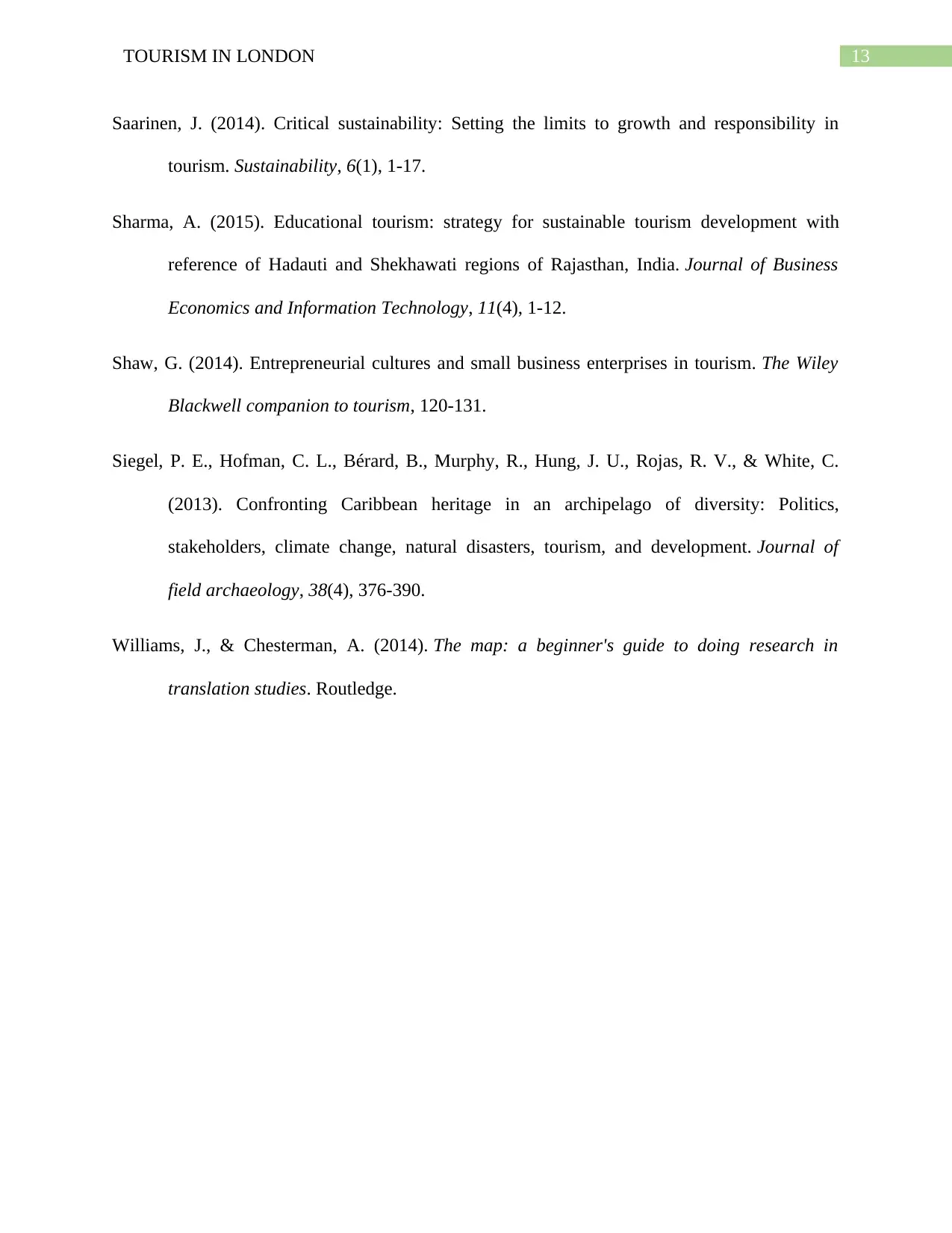
13TOURISM IN LONDON
Saarinen, J. (2014). Critical sustainability: Setting the limits to growth and responsibility in
tourism. Sustainability, 6(1), 1-17.
Sharma, A. (2015). Educational tourism: strategy for sustainable tourism development with
reference of Hadauti and Shekhawati regions of Rajasthan, India. Journal of Business
Economics and Information Technology, 11(4), 1-12.
Shaw, G. (2014). Entrepreneurial cultures and small business enterprises in tourism. The Wiley
Blackwell companion to tourism, 120-131.
Siegel, P. E., Hofman, C. L., Bérard, B., Murphy, R., Hung, J. U., Rojas, R. V., & White, C.
(2013). Confronting Caribbean heritage in an archipelago of diversity: Politics,
stakeholders, climate change, natural disasters, tourism, and development. Journal of
field archaeology, 38(4), 376-390.
Williams, J., & Chesterman, A. (2014). The map: a beginner's guide to doing research in
translation studies. Routledge.
Saarinen, J. (2014). Critical sustainability: Setting the limits to growth and responsibility in
tourism. Sustainability, 6(1), 1-17.
Sharma, A. (2015). Educational tourism: strategy for sustainable tourism development with
reference of Hadauti and Shekhawati regions of Rajasthan, India. Journal of Business
Economics and Information Technology, 11(4), 1-12.
Shaw, G. (2014). Entrepreneurial cultures and small business enterprises in tourism. The Wiley
Blackwell companion to tourism, 120-131.
Siegel, P. E., Hofman, C. L., Bérard, B., Murphy, R., Hung, J. U., Rojas, R. V., & White, C.
(2013). Confronting Caribbean heritage in an archipelago of diversity: Politics,
stakeholders, climate change, natural disasters, tourism, and development. Journal of
field archaeology, 38(4), 376-390.
Williams, J., & Chesterman, A. (2014). The map: a beginner's guide to doing research in
translation studies. Routledge.
1 out of 14
Related Documents
Your All-in-One AI-Powered Toolkit for Academic Success.
+13062052269
info@desklib.com
Available 24*7 on WhatsApp / Email
![[object Object]](/_next/static/media/star-bottom.7253800d.svg)
Unlock your academic potential
© 2024 | Zucol Services PVT LTD | All rights reserved.





